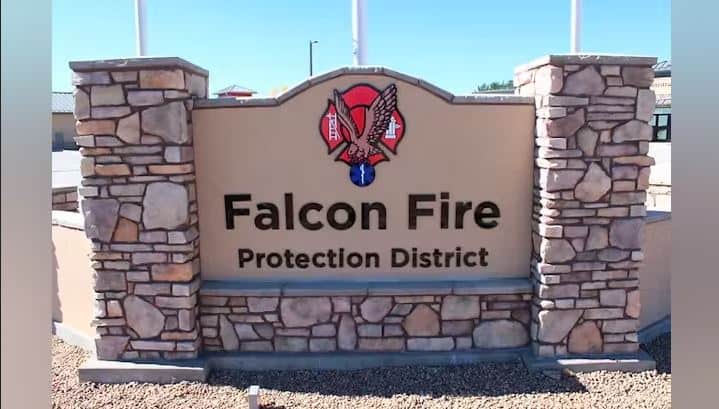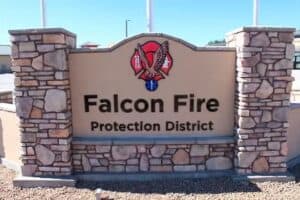By Jon Huang
May board meeting wrap-up
The Falcon Fire Protection District held its monthly board meeting May 15 at the Falcon Fire Administration Building at 7030 Old Meridian Road. Joan Fritsche, attorney; Tom Kerby, assistant secretary; Ray Hawkins, treasurer; James Reid, president (attended remotely); Dan Kupferer, vice president; Steve Podoll, secretary; Trent Harwig, chief, attended.
April minutes were unanimously approved.
New firefighter
Scott Hierholzer and Aric Meleg were sworn in as new firefighters.
Public comment
Chaplain Michael Collins announced that former assistant fire chief Dick Stewart died at home on April 28. He served with the department 15 years, retired from Hewlett Packard, was a HAM radio enthusiast and loved shooting. No service is planned.
Treasurer’s report
Harwig presented the numbers through April 2024, with 33.3% of fiscal year complete. The department has received 40% of the budgeted general fund and 36% of the specific ownership tax revenues. On May 15, he received a notice from the county treasurer’s office reporting a reduction in revenue from property taxes of $205,000. He requested an explanation from the treasurer’s office, which he has not received. Based on current projections, he expects to stay under budget by about $100,000. The general fund was at 28% of expected expenditures.
The Ambulance Transport Fund was at 29% expected revenues. Transport fees were at 35% of expected revenue. Total expenditures were at 26% of expected revenue.
The Capital Project Fund has received 25% of expected revenue. Expenditures were at 8% and will increase with the start of construction for the maintenance building. The Rural Water Fund showed no new activity.
Staff report
The operations reportthrough March 2024 was presented by Deputy Chief Jeff Petersma.
Call volumes in March did not show change in volume and district distribution.
Year-to-date through March showed a total of 1,007 calls, with 822 belonging to the department. Average response times remained stable.
There were no reserve hours for the month of March.
Petersma also provided an update regarding Colorado Springs Fire Department potential transition to taking over ambulance transport. He reported that in the likely event this occurs, AMR, the current Emergency Medical Services provider for the city, is unlikely to pick up the county contract that is up for renewal in October because of lower volumes. Meetings among agencies about future collaboration began in the last month.
Kerby thought it would be good to know what the eastern counties ambulance call volume currently is to determine what added effect this would have on Falcon, given its geographic proximity to areas that would be most affected if AMR did not renew their contract. Harwig said they likely have a total of 500 calls.
Petersma presented the EMS report.
Twenty-four month statistics show a cash per trip of $609.10 without a Medicaid supplement, and $782.84 cash per trip with a supplement. While this is still above the projected amounts in 2019 of $750; when the department first started ambulance transport, Kerby said that with national inflation rates the amount should be $920 today. Petersma explained that raising fees would not necessarily equate to higher reimbursement from private insurers; government reimbursement rates have not kept up with inflation.
Attorney’s report
Fritsche reported that the state has delayed the deadline before fines would be imposed for not meeting the Americans with Disabilities Act regulations for governmental websites, while also clarifying that the requirements will not apply to any material prior to 2024 that isn’t a currently active document
Fritsche reported that on May 10, Senate Bill 24-233 passed to lower property tax rates on residential and commercial properties, which would reduce the fire department’s revenue derived from these taxes. The new bill will also impose a 5.5% cap on increases of property tax-funded revenues even if a jurisdiction has previously opted out of prior revenue cap restrictions under TABOR. This does not apply to specific situations such as new construction, as well as annexations and inclusions.
Fritsche also noted that on May 8, Senate Bill 24-194 passed allowing the fire district to impose an impact fee on new development as an additional source of revenue. Any new fee must be legislatively adopted, generally applicable to a broad class of property and intended to defray the projected impacts on capital facilities caused by the proposed construction. The bill also allows the district to generate further revenue by imposing a new sales tax on businesses within its jurisdiction.
The board discussed that it’s unclear how enforceable such impact fees would be, given other states attempts at passing similar fees had been ruled unconstitutional by the U.S. Supreme Court. In addition, while sales tax revenues could ultimately be a more consistent source of future funding, it’s not clear how much revenue this would bring in. Because of a lack of data and potential future legislation, it’s unclear how much this will impact the future budget because of the impact these will have on department revenues.
Maintenance building project update
Harwig presented the pay application from Hammers Construction for the metal building for an amount slightly over $200,000. Kerby made a motion to reject it because it didn’t meet the terms of the contract, namely that the building permit had not yet been approved and the materials have not yet arrived, despite a contract date of April 25. It unanimously passed.
Station 1 Parcel- Tract B Sheriff’s Office substation update
Harwig recently sent inquiries regarding fire hydrant placement and the lack of an agreement for detention pond use and maintenance.
FFPD board meetings are usually held the third Wednesday of each month at 3 p.m. in the meeting room at Falcon Fire Administration, 7030 Old Meridian Road.
Stay connected with the Falcon Fire Protection District
Website: http://www.falconfirepd.org
Facebook: Falcon Fire Department
Twitter: @FalconFireDept
NextDoor.com





